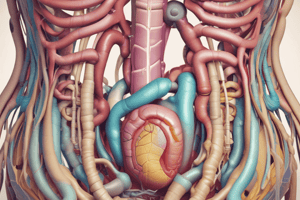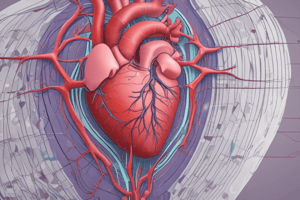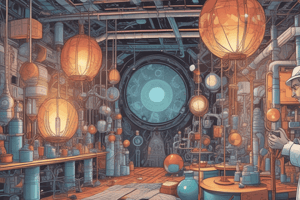Podcast
Questions and Answers
True or false:Chemistry is the study of how molecules combine to form everything.
True or false:Chemistry is the study of how molecules combine to form everything.
False (B)
True or false:Chemistry is the study of how atoms come together to form everything.
True or false:Chemistry is the study of how atoms come together to form everything.
True (A)
True or false: Atomic theory explains the existence of atoms and molecules.
True or false: Atomic theory explains the existence of atoms and molecules.
True (A)
True or false: Atomic theory explains the existence of atoms and molecules.
True or false: Atomic theory explains the existence of atoms and molecules.
True or false: Einstein mathematically proved the existence of atoms and molecules in 1905.
True or false: Einstein mathematically proved the existence of atoms and molecules in 1905.
True or false: Einstein mathematically proved the existence of atoms and molecules in 1905.
True or false: Einstein mathematically proved the existence of atoms and molecules in 1905.
True or false: Atoms are made up of protons, electrons, and neutrons.
True or false: Atoms are made up of protons, electrons, and neutrons.
True or false: Atoms are made up of protons, neutrons, and electrons.
True or false: Atoms are made up of protons, neutrons, and electrons.
True or false: The number of protons in an atom determines what element it is.
True or false: The number of protons in an atom determines what element it is.
True or false: The number of electrons in an atom determines what element it is.
True or false: The number of electrons in an atom determines what element it is.
True or false: The atomic number is the defining trait of an element.
True or false: The atomic number is the defining trait of an element.
True or false: The atomic number is the defining trait of an element.
True or false: The atomic number is the defining trait of an element.
True or false: Neutrons are found in the outer shell of an atom.
True or false: Neutrons are found in the outer shell of an atom.
True or false: Neutrons serve as a buffer between protons in the nucleus.
True or false: Neutrons serve as a buffer between protons in the nucleus.
True or false: Isotopes have the same mass but different chemical properties.
True or false: Isotopes have the same mass but different chemical properties.
True or false: Isotopes have different masses but the same chemical properties.
True or false: Isotopes have different masses but the same chemical properties.
True or false: The mass number is the total number of electrons in the nucleus.
True or false: The mass number is the total number of electrons in the nucleus.
True or false: The mass number is the total number of protons and electrons in the nucleus.
True or false: The mass number is the total number of protons and electrons in the nucleus.
True or false: The chemical symbol represents the atomic number, mass number, and charge of an element.
True or false: The chemical symbol represents the atomic number, mass number, and charge of an element.
True or false: The chemical symbol represents only the atomic number of an element.
True or false: The chemical symbol represents only the atomic number of an element.
True or false: Nucleus is the correct pronunciation of the word.
True or false: Nucleus is the correct pronunciation of the word.
True or false: "Nucleus" is the incorrect pronunciation of the word.
True or false: "Nucleus" is the incorrect pronunciation of the word.
True or false: Nuclei are where interesting chemical reactions occur.
True or false: Nuclei are where interesting chemical reactions occur.
True or false: Nuclei are where interesting chemical reactions occur.
True or false: Nuclei are where interesting chemical reactions occur.
Flashcards are hidden until you start studying
Study Notes
- Chemistry is the science of how atoms combine to form everything.
- Atomic theory explains the existence of atoms and molecules.
- Einstein mathematically proved the existence of atoms and molecules in 1905.
- Atoms are made up of protons, neutrons, and electrons.
- The number of protons in an atom determines what element it is.
- The atomic number is the defining trait of an element.
- Neutrons serve as a buffer between protons in the nucleus.
- Isotopes have different masses but the same chemical properties.
- The mass number is the total number of nucleons in the nucleus.
- The chemical symbol represents the atomic number, mass number, and charge of an element.
- "Nucleus" is the correct pronunciation of the word.
- Atoms were confirmed by Einstein's mathematical definition of Brownian motion.
- Elements are chemically pure substances.
- The type of element is defined by the number of protons in its nucleus.
- Neutrons stabilize nuclei.
- Isotopes of the same element cause relative atomic masses to not be whole numbers.
- Nuclei are uninteresting, while electrons are where interesting chemical reactions occur.
Studying That Suits You
Use AI to generate personalized quizzes and flashcards to suit your learning preferences.




